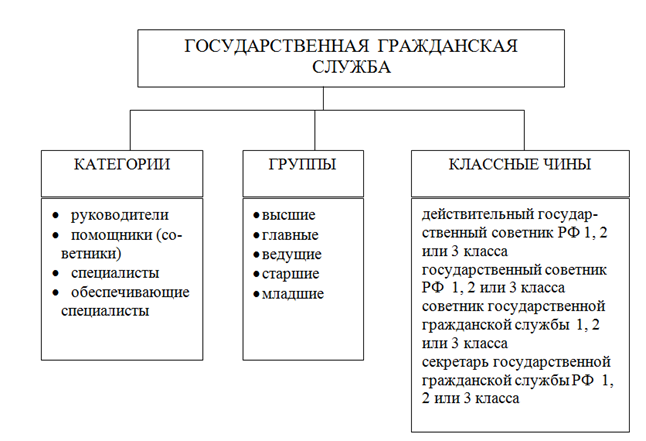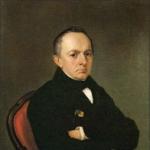The concept of civil service is defined by Federal Law 58 “On the system of civil service of the Russian Federation”.
public service Russian Federation – professional service activities of citizens of the Russian Federation to ensure the execution of powers:
Russian Federation,
federal authorities,
subjects of the Russian Federation,
public authorities of the constituent entities of the Russian Federation,
persons holding public positions of the Russian Federation, as well as public positions of the constituent entities of the Russian Federation.
State system. services includes includes the following types of public service:
state civil service
military service
law enforcement service
1. State civil service - a type of civil service, which is a professional service activity of citizens in the positions of the state civil service to ensure the execution of the powers of federal government agencies, state bodies of the subjects of the Russian Federation, persons holding public positions of the Russian Federation, and persons holding public positions of the subjects of the Russian Federation.
The State Civil Service of the Russian Federation is subdivided into:
federal public civil service
public civil service subjects RF.
The differences between the state civil service of the Russian Federation and the service of the constituent entity of the Russian Federation lies in the labor function performed by a Russian citizen in the interests of the Russian Federation as a whole or a particular region. In addition, the positions of the federal state civil service are established by federal law or a decree of the President of the Russian Federation, and the positions of the state civil service of the constituent entities of the Russian Federation are established by their laws or other by-laws.
The regulation of relations related to the civil service is carried out:
the Constitution of the Russian Federation;
FZ-58 "On the public service system of the Russian Federation";
FZ-79 "On the State Civil Service of the Russian Federation";
decrees of the President of the Russian Federation;
Decrees of the Government of the Russian Federation;
constitutions (charters), laws and other regulatory legal acts of the constituent entities of the Russian Federation;
normative legal acts of state bodies.
If an international treaty of the Russian Federation establishes other rules than those provided for by Federal Law-79, then the rules of the international treaty are applied.
2. Military service - a type of federal civil service, which is a professional service activity of citizens in military positions in the Armed Forces of the Russian Federation, other troops, military (special) formations and bodies that perform the functions of ensuring the defense and security of the state, which are awarded military ranks.
Military service is carried out:
in the Armed Forces of the Russian Federation (i.e. in bodies, institutions, troops subordinate to the Ministry of Defense of the Russian Federation);
in the internal troops of the Ministry of Internal Affairs of Russia;
in the railway troops;
in the bodies of the FSB of Russia, border troops;
in military formations of the system of the Ministry of Emergency Situations of Russia;
in other military formations.
For military service the main objective- protection of the country from encroachments of other states on the constitutional order, sovereignty, territorial integrity, military and economic potential of the country. Servicemen prepare for defense and carry out defense, protect state secrets, the state border and other important objects for the country.
Military Service Distinction from any other public service lies in the fact that it is completed not only on a voluntary basis, but also on the basis of conscription. According to this criterion, military service is divided into two types: contract service and conscription service.
Citizens enlisted (entering) for military service are presented with increased requirements to the state of health, education, level of professional training, moral and psychological qualities, fulfillment of physical training standards.
3. Law enforcement - a type of federal civil service, which is a professional service activity of citizens in law enforcement positions in state bodies, services and institutions that perform the functions of ensuring security, law and order, combating crime, protecting the rights and freedoms of man and citizen. Such citizens are assigned special ranks and class ranks.
Law enforcement activities are carried out by employees:
subdivisions of the criminal police and the public security police of the Ministry of Internal Affairs of Russia;
customs authorities of the Russian Federation;
fire-fighting and other services of the Ministry of Emergency Situations of Russia;
bodies of the Federal Service of the Russian Federation for Drug Control;
Federal bailiff service;
Federal Service for the Execution of Punishments;
State Courier Service of the Russian Federation.
The law enforcement service is called upon to protect the rights and freedoms of citizens and organizations, to ensure public safety, to combat crime and administrative offenses. As representatives of the authorities, law enforcement officers are endowed with broad powers, including the right to apply coercive measures, stop illegal actions (demand to stop illegal actions, deliver, detain citizens, seize property and documents, use weapons, etc.). They have special certificates, insignia, uniforms, and in many cases firearms.
The term "public service" was formed in Russia in the 90s. Then, for the first time, documents were accepted in which this term was mentioned. Prior to this, this term characterized all employees who work in institutions and organizations of the state. In some countries, this understanding has remained to this day.
The modern definition was formed from year to year, underwent various changes until it came into its current form. Over the years, a lot of regulatory documents have been created, the main of which were the Regulations on the Civil Service and the Law "On the Fundamentals of the Civil Service". It was after the adoption of these documents that relations began to develop in the field of work of the civil service.
According to the laws, the civil service is the activity of Russian citizens to ensure the authority to:
States of the Russian Federation as a whole;
Authorities;
Subjects of Russia;
Persons who replace positions legally established by the Constitution.
Ensuring authority, in this definition, refers to the immediate meaning of the organization itself and includes the organization, management, planning and control of all activities.
So, based on the foregoing, public service implies:
Significant activities for the state;
This is only a sector of state activity, which ensures the implementation of regulatory powers;
The subjects of this activity are subject to specific requirements that characterize the state policy.
When talking about public service, it is necessary to understand that this is a service to the state and its specific interests. State tasks are carried out, functions are carried out by people who are staff units in state bodies. Excluding service personnel.
Types and principles of public service
The legislation shows: the federal civil service and the civil service of the subjects that are under the jurisdiction of Russia.
The federal civil service is the activity of employees who exercise state and legal status, have certain powers and their competence extends within the limits of the Constitution of the Russian Federation. It is carried out in the system of judicial and executive authorities. These bodies include: the Government Office, the Presidential Administration, the chambers of the Federal Assembly, the Supreme Court, the Accounts Chamber, and others.
The civil service of the subjects is controlled by the laws that are adopted by the legislative authorities of each of the subjects. Therefore, in order to understand the essence of the public service of each subject, it is necessary to study each subject separately.
There are other classifications of species. Also, the public service can be civil and militarized.
Civil is general and special. General exercise general functions, which do not differ by special factors. In turn, the special civil service implements specific goals that have sectoral affiliation.
Militarized civil service - service in the armed forces, in internal affairs bodies, government communications departments, tax police, and other law enforcement agencies. It differs from the civil civil service in the following aspects:
It has special statutes, various disciplinary provisions;
Employees of these services must meet specialized conditions.
The principles of public service are a semantic complex that establishes various rules and laws, tasks and functions, powers for entities whose activities are related to public service. The principles define the essence of relationships in the area of public service.
Modern aspects of public service are tracked in various documents and implemented by employees through the performance of daily professional activities. They can be divided into constitutional and organizational.
Constitutional principles are reflected in normative acts, documents, resolutions. These include the following principles:
The principle of the supremacy of the Constitution as the main document of the state;
The principle of primacy and significance of the rights and freedoms of citizens;
The principle of complexity and consistency of public service;
The principle of distinguishing three vectors of power (legislative, executive, judicial)
The principle of equality of citizens in employment in public service bodies.
Organizational principles include ways of creating and functioning of the public service, ensure its effectiveness and direction. These include the following principles:
The principle of subordination and diligence of some employees of the civil service, in front of other employees who are higher in the job hierarchy;
The principle of generality of the basic rules and requirements inherent in the public service;
The principle of high qualification and professionalism of public service employees;
Publicity policy implemented by the civil service;
The principle of constancy of personnel, which the public service has.
Functions of the public service and its regulation
When it comes to the functions of the civil service, it implies the direct activities of civil servants. This activity includes the following functions:
Legitimate function - consists in exercising the powers of the regulatory and distributive sense, the execution of state powers on behalf of the state, or a body of state government;
Law-forming function - consists in the creation and development of regulatory legal acts, the creation and use of laws and other important documents;
Regulatory function - based on the development and implementation of state policy in all spheres of life, the implementation of legal powers, the use of a system of state coercion against persons and ensuring their interests;
Organizational function - includes the implementation of the competence and legitimacy of state bodies, the implementation of organizational measures and technical operations that contribute to organizational processes;
Legal function - consists of the implementation of measures that contribute to ensuring the rights of citizens, the fulfillment of obligations to the state.
It can be said that the civil service consists of the activities of civil servants, which consists in the implementation of all branches of state power in various spheres of society, in order to implement the principles, tasks and functions of the state.
The foundations of the legal policy and functionality of the public service are laws, decrees, resolutions, orders and other regulatory legal acts. The constitution in its form cannot incorporate all aspects that will allow regulating the activities of the public service, therefore there are many other documents that can improve this process.
Now consider what the definition of a civil service position means. According to the documents, the position of the civil service is determined and approved by laws or other acts.
Positions in the civil service are divided into the following:
Positions of the civil federal structure;
Positions of the civil service of the subject of the Russian Federation;
military positions;
Law enforcement positions.
List of civil service positions;
List of existing military positions;
Model lists of positions of law enforcement agencies.
Civil service positions are allocated according to the following aspects:
By type of activity - managerial, controlling, planning, etc.;
According to the scale of distribution - typical and individual.
According to the availability of jobs - employed and vacant;
According to the ratio between civil servants and the positions they hold, they are divided into groups 5th group (highest positions), 4th group (main positions), 3rd group (leading positions), 2nd group (senior positions), 1 -I group (lower positions).

How to enter the public service
According to the Constitution of the Russian Federation, there is equal access for citizens of the country to enter the public service. At the same time, the main factors for choosing candidates are professionalism, stress resistance, decency and high labor productivity.
A citizen cannot be admitted to the civil service if:
Recognized as incapacitated by the decision of the court or has limited legal capacity;
Is deprived of the right to work in public authorities by order of the court;
If there are diseases confirmed by a medical report that do not allow the performance of official duties;
Unwillingness to undergo a special procedure for access to public service information;
Citizenship of another state, with the exception of special cases;
Close relationship with civil servants, except in some cases;
Unwillingness to provide the necessary data for admission to the public service.
It is possible to enter the civil service through appointment, enrollment, selection or competition. Each method is prescribed in special laws and carefully controlled.
Enrollment occurs when positions of additional staff are filled. It is drawn up by special acts, is labor contract or .
Appointment to a position is characterized by the same legal aspects, differs only by a specific administrative act. Persons who hold a position by appointment are limited to managerial positions.
Elections for office are a fairly common way. They choose from those who are elected, there is no need to draw up an act, but an employment contract based on the results of the electoral process.
The essence of the competition is that the position is filled by holding competitions between candidates. The specifics of the competitions are established at the legislative level. On the this moment the competitive basis is a common way to replace staff.
The civil service of the Russian Federation is a legal structure that does not stand still and is in constant development. It is transformed, updated with new tools, changes under the influence of external and internal factors. This suggests that this area needs to be developed and reformed.
Reformation is the result of multiple factors:
The need to create and consolidate a new modern statehood in Russia;
The division of state power into three areas: legislative, executive and judicial;
Facilitating legal changes;
Improvement of the economic climate;
Consolidation of the highest bodies of state power and local self-government;
Formation of the apparatus of state and municipal authorities;
Development of principles and methods of a new personnel state policy;
Carrying out activities to strengthen state authorities.
Legal regulation needs to be given more time, lagging behind the processes of economic and political development. Because the civil service is no less important than a public institution, it is designed to ensure the stable and lawful government of the state. It is also able to play a decisive role in the implementation of stable processes in the social, political and economic life states.
State civil service of the Russian Federation (civil service) - a type of public service, which is a professional service activity of citizens of the Russian Federation in the positions of the state civil service of the Russian Federation (civil service positions) to ensure the execution of the powers of federal state bodies, state bodies of the constituent entities of the Russian Federation, persons, holding public positions of the Russian Federation, and persons holding public positions of constituent entities of the Russian Federation (including being in the personnel reserve and other cases).
The State Civil Service of the Russian Federation is subdivided
federal state civil service;
state civil service of the constituent entities of the Russian Federation.
The principles of the civil service are:
priority of human and civil rights and freedoms;
the unity of the legal and organizational foundations of the federal civil service and the civil service of the constituent entities of the Russian Federation;
equal access for citizens who own state language Russian Federation, to civil service and equal conditions for its passage, regardless of gender, race, nationality, origin, property and official position, place of residence, attitude to religion, beliefs, membership in public associations, as well as other circumstances not related to the professional and business qualities of a civil servant;
professionalism and competence of civil servants;
stability of the civil service;
availability of information about the civil service;
interaction public associations and citizens;
protection of civil servants from unlawful interference in their professional activities.
The regulation of relations related to the civil service is carried out by the Constitution of the Russian Federation, the Federal Law "On the System of the Public Service of the Russian Federation", Federal Law of July 27, 2004 N 79-FZ "On the State Civil Service of the Russian Federation" * (95), others federal laws, decrees of the President of the Russian Federation, resolutions of the Government of the Russian Federation, regulatory legal acts federal bodies executive power, constitutions (charters), laws and other regulatory legal acts of the constituent entities of the Russian Federation, regulatory legal acts of state bodies.
The civil service is interconnected with the public service of the Russian Federation of other types. This relationship is ensured on the basis of the unity of the public service system of the Russian Federation and the principles of its construction and functioning. In addition, this relationship is due to the following factors:
correlation of basic conditions and wages, basic state social guarantees;
the establishment of restrictions and obligations in the course of the civil service of the Russian Federation of various types;
taking into account the length of service of the civil service of the Russian Federation of other types when calculating the length of civil service;
the correlation of the main conditions of the state pension provision of citizens who have served in the public service of the Russian Federation.
The civil service is also interconnected with the municipal service. The relationship between the civil service and the municipal service is ensured through:
unity of basic qualification requirements to civil service positions and municipal service positions;
unity of restrictions and obligations in the course of civil service and municipal service;
unity of requirements for professional training, retraining and advanced training of civil servants and municipal employees;
accounting for the length of service of the municipal service when calculating the length of service in the civil service and the length of service in the civil service when calculating the length of service in the municipal service;
the correlation of the main conditions of remuneration and social guarantees for civil servants and municipal employees;
the correlation of the main conditions for the state pension provision of citizens who have served in the civil service, and citizens who have served in the municipal service, and their families in the event of loss of a breadwinner.
One of the key civil service institutions defined by the Federal Law "On the State Civil Service of the Russian Federation" is the institution of the civil service position. Passing the civil service is possible only in the civil service. When dismissed from office and not being appointed to another position, a person is dismissed from the civil service.
Positions of the federal state civil service are established by federal law or a decree of the President of the Russian Federation, positions of the state civil service of the constituent entities of the Russian Federation - by laws or other regulatory legal acts of the constituent entities of the Russian Federation, subject to the provisions of this Federal Law, in order to ensure the execution of the powers of a state body or a person replacing a public position .
The Federal Law "On the State Civil Service of the Russian Federation" contains a classification of civil service positions, which are divided into categories and groups.
Civil service positions are divided into the following categories:
managers - positions of heads and deputy heads of state bodies and their structural divisions, positions of heads and deputy heads territorial bodies federal executive bodies and their structural subdivisions, positions of heads and deputy heads of representative offices of state bodies and their structural subdivisions, substituted for a certain term of office or without limitation of the term of office;
assistants (advisers) - positions established to assist persons holding public positions, heads of state bodies, heads of territorial bodies of federal executive bodies and heads of representative offices of state bodies in the exercise of their powers and occupied for a certain period, limited by the term of office of these persons or heads;
specialists - positions established for the professional support of the performance of established tasks and functions by state bodies and filled without limitation of the term of office;
providing specialists - positions established for organizational, informational, documentation, financial, economic, economic and other support of the activities of state bodies and replaced without limitation of the term of office.
Civil service positions are divided into the following groups:
senior positions in the civil service;
the main positions of the civil service;
leading positions in the civil service;
senior positions in the civil service;
junior positions in the civil service.
The Federal Law also contains the concept of registers of positions of the state civil service of the Russian Federation.
The positions of the federal state civil service, classified by state bodies, categories, groups, as well as other characteristics, make up the lists of positions of the federal state civil service, which are the relevant sections of the Register of positions of the federal state civil service.
The register of positions of the federal state civil service is approved by decree of the President of the Russian Federation * (96). The register of positions of the state civil service of the subject of the Russian Federation is approved by law or other regulatory legal act of the subject of the Russian Federation, taking into account the provisions of this Federal Law, as well as the structure of state bodies, names, categories and groups of positions of the state civil service of the Russian Federation, established by the Register of positions of the federal state civil service .
The register of positions of the federal state civil service and the registers of positions of the state civil service of the constituent entities of the Russian Federation form the Consolidated register of positions of the state civil service of the Russian Federation.
Qualification requirements are established for civil service positions. These include level requirements vocational education, length of service in the civil service (public service of other types) or length of service (experience) in the specialty, professional knowledge and skills necessary for the performance official duties. Qualification requirements for professional knowledge and skills necessary for the performance of official duties are established by a regulatory act of a state body, taking into account its tasks and functions, and are included in the official regulations of a civil servant.
Qualification requirements for civil service positions are established in accordance with the categories and groups of civil service positions. Thus, among the qualification requirements for civil service positions of the categories "heads", "assistants (advisors)", "specialists" of all groups of civil service positions, as well as the category of "providing specialists" of the main and leading groups of civil service positions, includes the presence of higher professional education . Among the qualification requirements for civil service positions of the category "providing specialists" senior and junior groups positions of the civil service includes the presence of secondary vocational education, corresponding to the direction of activity.
Qualification requirements for length of service in the civil service (public service of other types) or length of service (experience) in the specialty for federal civil servants are established by decree of the President of the Russian Federation, for civil servants of a constituent entity of the Russian Federation - by the law of a constituent entity of the Russian Federation.
In accordance with the civil service position to be filled within the group of civil service positions, civil servants are assigned class ranks of the civil service. Civil servants who fill positions in the civil service without limiting the term of office are assigned class ranks based on the results of a qualification exam. The assignment of a class rank directly depends on the group of positions in the civil service.
The regulation on the procedure for assigning and maintaining class ranks of the state civil service of the Russian Federation by federal state civil servants was approved by Decree of the President of the Russian Federation of February 1, 2005 N 113 * (97). The qualification ranks previously assigned to federal civil servants are considered to be the corresponding class ranks of the civil service.
The professional performance of a civil servant is carried out in accordance with the official regulations approved by the head of the state body and is integral part administrative regulations of the state body. Approximate job regulations are approved by the relevant public service management body. The regulations include:
qualification requirements for the level and nature of knowledge and skills for a civil servant who replaces the relevant civil service position, as well as for education, length of service in the civil service (public service of other types) or length of service (experience) in the specialty;
official duties, rights and liability of a civil servant for failure to perform (improper performance) of official duties in accordance with the administrative regulations of the state body, the tasks and functions of the structural unit of the state body and the functional features of the civil service position occupied in it;
a list of issues on which a civil servant is entitled or obliged to independently make managerial and other decisions;
a list of issues on which a civil servant is entitled or obliged to participate in the preparation of draft regulatory legal acts and (or) draft management and other decisions;
terms and procedures for the preparation, consideration of draft management and other decisions, the procedure for agreeing and adopting these decisions;
the procedure for official interaction of a civil servant in connection with the performance of his official duties with civil servants of the same state body, civil servants of other state bodies, other citizens, as well as with organizations;
a list of public services provided to citizens and organizations in accordance with the administrative regulations of the state body;
indicators of the efficiency and effectiveness of the professional performance of a civil servant.
The results of the execution of official regulations by a civil servant are taken into account when holding a competition for filling a vacant position in the civil service or including a civil servant in the personnel reserve, assessing his professional performance during certification, a qualification exam or encouraging a civil servant * (98).
An important concept is the length of service (total duration) of the civil service. Replacement periods are included in the length of service in the civil service to establish a monthly bonus to the official salary for long service, to determine the duration of additional annual paid leave for long service and the amount of incentives for impeccable and efficient civil service.




















